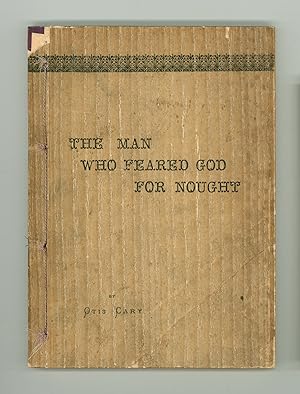About this Item
This unusual and scarce book is "The Man Who Feared God for Nought, Being a Rhythmical Version of the Book of Job" by Otis Cary. It was printed at the Okayama Orphan Asylum in 1898 in Japan, and distributed in the United States by the Fleming H. Revell Company. There is a Preface and generous Introductory Notes. Then follows the translation of the "Book of Job" in verse format. This is the First Edition. It is OP . ************************************ The Okayama Orphan Asylum was founded by Ishii Juji during the Meiji era. It was one of the most famous orphanages in Japan. Ishii, a Christian, was influenced by the Social Gospel Movement. He strove to provide a safe, nurturing environment for orpahn children in which they could grow and develop through creative activities, such as the printing and binding of this book. The children printed the book , and it was then picked up by the publisher Revell, who distributed the book in the United States. The book has a small print run, and thus specimens are scarce on the market. That the book was created as a fragile softcover did not contribute to its survival. ******************************************** Otis Cary ( 1851 - 1932) was a Christian missionary in Japan, affiliated with the Church of Christ in Japan (Presbyterian). ***************************************** TITLE : The Man Who Feared God for Nought, Being a Rhythmical Version of the Book of Job / AUTHOR : Otis Cary (1851 - 1932) / IMPRINT / DISTRIBUTOR : Fleming H. Revell (Offices in Chicago) / PRINTER / BINDER : Okayama Orphan Asylum under the guidance of Ishii Juji (1865 - 1914) / PLACE : Okayama, Japan / DATE : 1898 / EDITION : First Edition / SPECIAL ATTRIBUTES : Bound in thin kiri tree bark / STATUS : RARE. THIS EDITION OP / PHYSICAL DETAILS : Small sized trade book, softcover format; xxix + 84 pages; approximately 5 1/4" x 7 1/4" ; sewn thin kiri bark covers with lettering in ornate font on front. A decorative band is stamped across the top of the front cover; The text is printed on thin Japanese paper which has toned considerably. It is bound in he traditional Japanese manner. ****************************************** CONDITION : The binding is unusual, being two thin plies of kiri tree bark which have been sewn with thread about the text-block. This is a typical Japanese style binding. The binding has seen considerable wear, being chipped and creased, but it is still intact, with no detached or loose leaves. the text was printed on thin Japanese paper which is considerably toned. A previous reader has penciled a few marginal marks and underlining, else the interior is clean. There is also a penciled inscription on one of the preliminary blank pages, a view of which I have provided. Seller Inventory # 1211
Contact seller
Report this item
![]()




